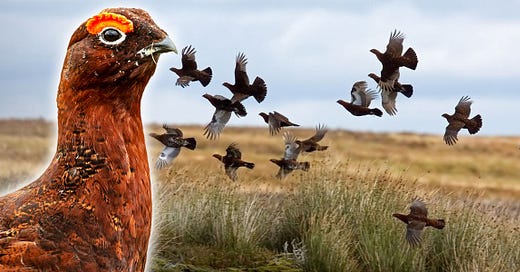Government fails Nature again, rejecting call for grouse shooting ban
Despite admitting that evidence shows it is linked to raptor persecution and habitat destruction
The government has rejected a call from the Wild Justice team to ban driven grouse shooting. In a parliamentary petition, the Wild Justice founders said a ban was needed because the practice is "bad for people, the environment and wildlife." In response, the government revealed that it has "no plans" to ban driven grouse shooting, despite acknowledging that evidence shows it is linked to raptor persecution.
Wild Justice's Chris Packham, Ruth Tingay, and Mark Avery, started the petition in late 2024. In it, they presented multiple reasons for banning driven grouse shooting, all of which Protect the Wild has covered in numerous posts (see eg OPINION: There's nothing 'glorious' about killing grouse). They highlighted that management of grouse moors involves the intentional burning of moorland, which "contributes to climate breakdown." Management practices also include land draining that "leads to flooding and erosion," they added.
Further, grouse moor management involves the "wholesale extermination of predators," as we have pointed out many times. This persecution occurs to ensure that grouse are not predated by other wild animals, as the industry wants as many of them around as possible for people to shoot. But this has a "disastrous impact" on ecosystems, the petition warned. It pointed to "the criminal practice of raptor persecution" as another issue, which is consistently linked to the shooting industry.
However, the Department for Environment, Food and Rural Affairs (DEFRA) rejected the idea of a ban, despite grouse shooting's harms. It said:
"The Government considers that well-managed shooting activities can bring benefits to the rural economy and can be beneficial for wildlife and habitat conservation. We will continue work to ensure a sustainable, mutually beneficial relationship between shooting and conservation. The Government has no plans to ban grouse shooting."
An industry incapable of responsible management
DEFRA's choice of language is telling. It says 'well-managed' shooting 'can' be beneficial for wildlife and conservation but fails to address the issue that shooting is NOT well-managed to ensure it is beneficial for wildlife and conservation.
In 2021, the then Conservative government introduced a partial ban on peatland burning in England. It took this action to protect some of the country's most sensitive peatland places after asking landowners to voluntarily stop burning. As DEFRA noted at the time:
"This voluntary approach failed, primarily owing to the reluctance of landowners to adopt more sustainable practices."
A 2022 investigation by Greenpeace's Unearthed revealed that landowners continued to resist changing their unsustainable behaviour, even after the prohibition was introduced. The Unearthed investigation identified over 250 peatland burning incidents in the first burning season following the ban. One in five of these identified incidents were on precisely the sensitive peatland that the prohibition aimed to protect.
The burning season occurs from 01 October to 15 April in upland areas and 01 November to 31 March elsewhere.
The RSPB carried out a probe that season too. It found that over 270 burns reportedly took place, mostly on important Nature sites, with 70 of them "in clear violation of the new rules."
In other words, the shooting industry is neither well-regulated in practice nor has it demonstrated that it is capable of good, responsible management. As a result, the industry and its activities are not beneficial for wildlife, conservation, or the climate.

Not beneficial to raptors
The issue of raptor persecution is another case in point. The shooting industry's precise involvement in this persecution is well understood and actually limits the spread of a number of birds of prey - especially Hen Harriers, Golden Eagles, and Peregrines. The RSPB's Birdcrime reports repeatedly shows that most raptor persecution is linked to the industry. For instance, the latest report revealed that the shooting industry was connected to 75% of the 57 convictions for raptor persecution between 2009 and 2023.
This low number of convictions reflects how difficult it is to identify and prosecute perpetrators, as over the same period, at least 1,344 birds of prey were illegally killed, according to the report.
In its response to the petition, DEFRA acknowledged that evidence exists which points to links between grouse shooting and "crimes against birds of prey." It also highlighted the National Wildlife Crime Unit's efforts to tackle wildlife crime perpetrated by anyone and insisted that any "proven perpetrators" should face "the full force of the law."
But again, it avoided confronting the reality on the ground. The existing evidence shows that grouse moors are most certainly not 'well-managed' to ensure they are beneficial to raptors, regardless of the laws in place. Needless to say, the management of these moors is not beneficial to the many other wild animals who are legally killed on them either.
A shabby response
As Wild Justice pointed out in their response to DEFRA's position, the hefty numbers of signatures on multiple similar petitions by a number of organisations over recent years show that public support for change on this issue is high. This petition alone has attracted over 46,000 signatures so far.
Signatories may have hoped that the Labour government would take action because, as Dr Avery highlighted, some of its shadow ministers promoted reviews or licensing of grouse moors when the party was in opposition. As the Wild Justice co-founder put it, what people got instead was a DEFRA response that:
"rates as just as bad as the responses from previous Conservative Defra ministers – in fact it could easily pass as a response from a Conservative administration looking as it does, as if it were actually written by the shooting industry."
The petition remains open for signatures. If it reaches 100,000, it could secure a debate in parliament. This would mean the government can be grilled on this shabby response and what it plans to do instead of a ban – if anything –to tackle the harms of the shooting industry.
While driven grouse shooting is of course an important issue - and the government is failing nature by not banning it - Protect the Wild wants to see all shooting ended.
After all the issues of vast numbers of birds being shot, raptor persecution, mammal 'control', and habitat 'management' for shooting are common to all aspects of bird shooting whether that be on grouse moors, in lowland woodland, or along our estuaries and coasts. Millions upon millions of birds are shot out of the sky for fun every year by a rapacious industry that has no place in the 21st century. That has to stop.
Our latest video unpacks why the rise of Reform is not good news for animals..






Labour obviously lied about their animal manifesto promises. These promises were the only reason I voted for them. Well, never again 😡
What did we expect from these habitual liars no doubt somebodys pockets are being lined 💰💰💰 nothing is sacred anymore just another lot of lies from this pathetic government